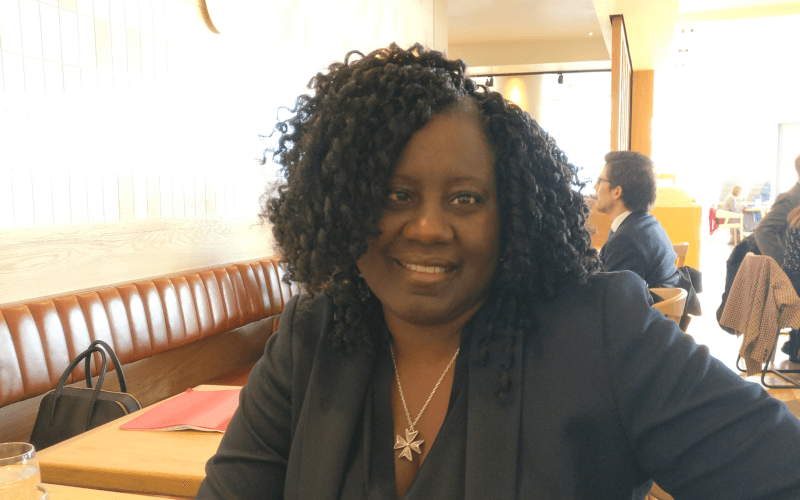A disabled shadow minister has called on the government to do more to improve its “inadequate” record on improving access to rail travel, and to provide enough funding to ensure all train journeys are accessible “from end to end”.
Marsha de Cordova, Labour’s shadow minister for disabled people and the MP for Battersea, was speaking three months after Disability News Service revealed that spending on the government’s rail station access improvement programme had been slashed over the last five years.
Those figures, released through a freedom of information request, showed spending on the Access for All scheme fell from as much as £81.1 million in 2013-14 to just £14.6 million last year.
The cuts are set to continue this year and next year, although spending is due to rise to up to £50 million a year over the following five years, with an additional £50 million in deferred funding.
De Cordova (pictured), who had secured the debate on step-free access to stations in her constituency, asked transport minister Nusrat Ghani why three of the four stations in Battersea were not accessible to wheelchair-users.
She told the minister that the three stations – Battersea Park, Queenstown Road and Wandsworth Town – had no step-free access, even though they served 7.5 million passengers a year.
Although Clapham Junction, the country’s busiest station in terms of rail traffic, has step-free access to all its platforms, there is still no step-free access onto the trains themselves, she said.
Battersea Park has had Access for All-funded work delayed, while Queenstown Road and Wandsworth Town are both due to have fully-accessible new entrances, even though there will still be no step-free access to the platforms.
De Cordova said: “What is the point of having an accessible step-free entrance, but no step-free access to the actual train platform?”
She added: “Step-free access to stations can mean the difference between the ability to lead a fulfilling and flourishing life seeing friends and family and going to work, and being left isolated at home, unable to travel and excluded from participation, from leading a fulfilling and flourishing life, and from the world of work.
“That is the reality for far too many disabled people.”
She said progress in making all stations accessible to disabled people through Access for All – founded by the Labour government in 2006 – had been “too slow”, with only one in five stations across the country fully accessible.
She called for the Access for All programme to receive enough funding to ensure that all stations are step-free.
De Cordova said: “Train journeys must be accessible from end to end. That means that someone can get to the station, on to the train, off the train and out of the station at the other end.
“I call on the government to put in the investment needed to build an inclusive railway, including accessible stations in Battersea.”
She said the “unreasonable” requirement for disabled people to book assistance in advance “prevents spontaneous travel and removes the ability to turn up and go”, while the removal of guards from trains meant the railway system was becoming more inaccessible.
Ghani said the government’s aim was to ensure disabled people “have the same access to transport as everyone else” by 2030, to “ensure that we come into line with the UN’s ambition to ensure accessibility across all modes of transport”.
She said: “People should have the same access to transport and the same opportunity to travel as everyone else, and this is an important measure to reduce social isolation and create opportunities for people to play a more active role in society.”
She said the Access for All funding announcement meant design work would “restart on all deferred projects from April next year, and once the designs are completed, Network Rail will confirm the construction date for Battersea Park”.
Ghani said the rail industry had been asked to nominate stations for new Access for All funding by 16 November, with the money to be allocated “based on annual footfall and weighted by the incidence of disability in the area” and taking into account local factors such as distance to a hospital or availability of third-party funding.
And she said there would be “a fair geographical spread of projects across the country”.
She said that neither Queenstown Road nor Wandsworth Town had previously been nominated for Access for All funding.
And she said the government was pressing the industry to “comply with its legal obligations to ensure that work at stations meets current accessibility standards”, including on major projects such as Crossrail and the redevelopment of Birmingham New Street, and on other work such as ensuring that replacement bridges have lifts or ramps.
A note from the editor:
Please consider making a voluntary financial contribution to support the work of DNS and allow it to continue producing independent, carefully-researched news stories that focus on the lives and rights of disabled people and their user-led organisations.
Please do not contribute if you cannot afford to do so, and please note that DNS is not a charity. It is run and owned by disabled journalist John Pring and has been from its launch in April 2009.
Thank you for anything you can do to support the work of DNS…

 Frustration after government only issues partial ban on new floating bus stops
Frustration after government only issues partial ban on new floating bus stops Report suggests five big ideas that could transform disabled people’s mobility
Report suggests five big ideas that could transform disabled people’s mobility Government’s ‘weak’ response to damning transport access report puts right to travel in ‘grave danger’
Government’s ‘weak’ response to damning transport access report puts right to travel in ‘grave danger’